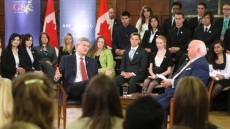QUEBEC — Most of Canada's provincial and territorial premiers are meeting to discuss climate change, a day after Ontario Premier Kathleen Wynne announced her province is joining Quebec and California in a cap-and-trade system.
Today's get-together in Quebec City includes all leaders except British Columbia's Christy Clark, Alberta's Jim Prentice, Nova Scotia's Stephen McNeil and Prince Edward Island's Wade MacLauchlan.
Those four provinces are represented by other officials.
The country's premiers agreed last year to plot out a national strategy on energy and climate policy in the absence of federal leadership.
The Conservative government, which ran on a platform in 2008 that included a cap-and-trade policy, argues that any effort to price carbon is an economy killer.
A report last week from a blue-chip panel of economists asserted carbon pricing is the most efficient and effective way to meet Canada's carbon-reduction goals — and that provincial governments were best situated to design their own programs.
Quebec Premier Philippe Couillard was asked before today's meeting began whether the provinces should do more to pressure Ottawa to act on climate change.
"It's not the provinces, it's the population, the population demands that action should be taken," he replied.
"The only way forward to Paris (a worldwide conference on climate change this coming December) is consultation and collaboration. The provinces' actions need to be quantifiable.
"The objective of the day is to allow each province and territory to tell Canadians this is our situation, this is what we want to do, this is what we are doing, this is what we plan on doing."
Couillard said he understands why Prentice is not at the meeting.
"I know Jim Prentice is very serious about this issue," he said. "After the (May 5 Alberta) election, I'm sure we'll do some great work with him, or whoever is the next premier of Alberta."
Paul Kovacs, executive-director of the Institute for Catastrophic Loss Reduction at Western University, said climate change is having a profound impact on the country.
"The scientific literature indicates that the main impact on Canada of climate change is that it will be warmer, wetter and stormier," he said after addressing the meeting. "Regional implications of climate change include permafrost thaw in the north, wildfires in many parts of the country, coastal erosion and droughts.
"The idea of Canada's leaders coming together and coming with a plan to address climate change is incredibly important. Today is an important step in that direction."
Quebec Environment Minister David Heurtel bemoaned the federal government's approach to the topic.
"We're still waiting for a partnership with Ottawa," he said. "We've sent many different types of messages to Ottawa to sit down and work on this issue.
"We're still waiting for a response."




